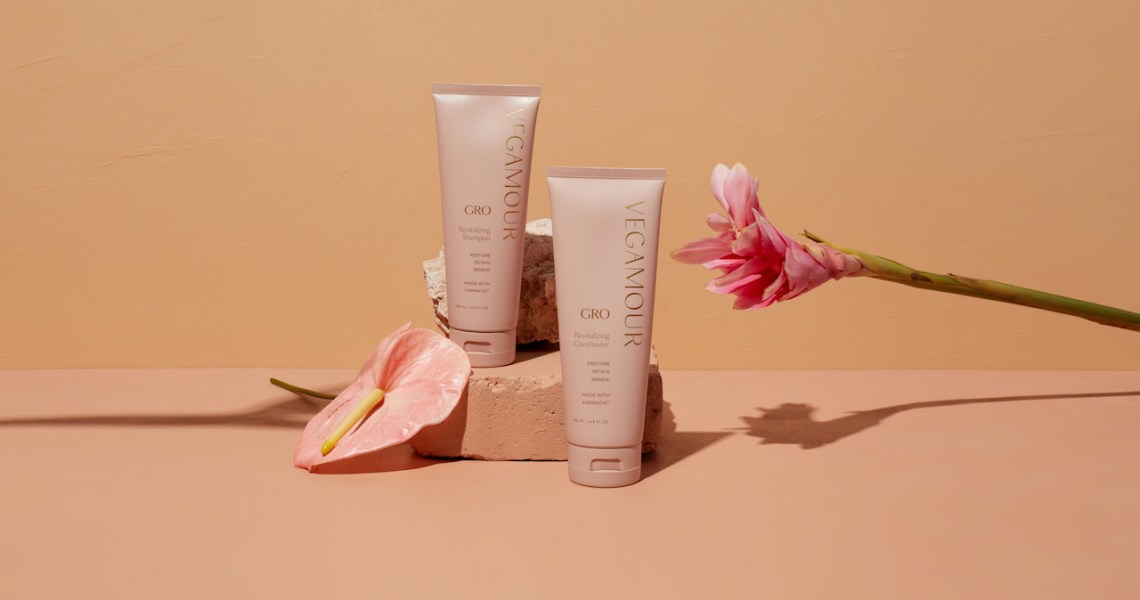As states across the country begin to implement new Covid-19 restrictions for businesses and stricter gathering orders, beauty companies are bracing for more change. For the better part of eight months, the salon industry has had to rethink the viability of in-person hair services such as cuts and color, versus DIY options customers can do themselves. But some companies have bet that at-home treatments are here to stay — even for the most elaborate of services.
Clean hair restoration brand Vegamour is one of them. This week, the company is debuting a first-ever vegan keratin alternative called “Karmatin,” made with plant-based silk protein. The two shampoo and conditioner products are meant to be washed in and out of hair, unlike an in-salon keratin treatment, and are priced from $42-$48, versus the the $250-$700 salons typically charge. In October, hair tools brand NuMe also launched its own vegan, paraben-free and formaldehyde-free “tourmaline smoothing at-home treatment” digitally. And in January 2021, Gussi Hair will also offer formaldehyde-free keratin treatments DTC-only, allowing clients to take straightening services into their own hands.
The timing is right for these brands, not only due to pandemic, but because of the toxicity claims linked to keratin treatments, including those linked to nose bleeds and cancer. According to new information, the F.D.A. has reportedly wanted to ban hair straighteners with formaldehyde as far back as 2016.
According to a Gussi Hair spokesperson, beyond the dangerous health hazards of keratin services, the new brand is attempting to solve the issues of the time suck of going to the salon (treatments typically last tw0 hours) and the high cost (Gussi’s pre-shampoo, which lasts 6-12 weeks, is $65 versus hundreds of dollars).

Dan Hodgdon, co-founder and CEO of Vegamour, said the brand’s new Karmatin products were specifically requested from its existing customers. “We are a true DTC brand which means we are always testing and learning. We see a great opportunity to cross-sell and round out the hair wellness routine for our engaged audiences,” he said.
Wellness and health is certainly Vegamour’s play in the keratin space, as it already sells its Gro serums, which are plant-based, cruelty-free and meant to increase hair density. Vegamour has seen 800% year-on-year growth, due to customer reports of pandemic stress and hair loss, said Hodgdon. The friends-and-family funded company is expected to hit $40 million in sales for 2020, and at the current run rate, that will double in 2021. And social engagement for the company is also high: According to Tribe Dynamics, Vegamour is now the fastest-growing hair brand in the U.S.
For the launch this week, Vegamour is relying on its mix of 60% organic support and 40% paid media. Hodgdon would not disclose its current marketing spend, but said that the company sees strong results when a “true” brand advocate engages with its audience — he cited a post by influencer Shea Whitney, who has 1.2 million followers on YouTube, as an example. Vegamour largely facilitates these placements unpaid or through its affiliate model, which offers influencer-specific discounts.
Previously in 2019, Vegamour’s best sellers were its lash and brow products to boost hair growth. Those products accounted for 76% of sales last year. Hodgdon said that innovation in the keratin space, with regard to the clean and conscious customer, is long overdue. This is especially true, as nearly every traditional beauty ingredient, from talc to mica, is being rethought in cosmetics.
“Vegamour is positioned at the crossroads between ‘treatment’ and ‘prevention.’ Covid[-19] has been an accelerant for our brand, as more people are experiencing hair loss due to stress. They’re now really looking for our clean, safe, effective hair solutions that offer a self-care opportunity,” said Hodgdon.




